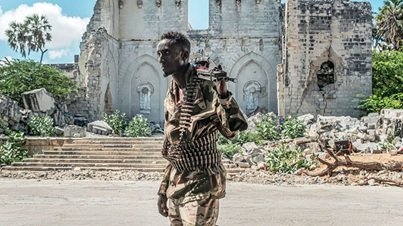
The road from Garowe, the capital of Puntland statelet in northern Somalia, to the port of Bosaso runs through territory occupied by two of the world’s most notorious jihadist groups (see map). In the remote mountains to the east is an outpost of Islamic State (IS). To the west is al-Shabab, al-Qaeda’s richest and most lethal affiliate. For the past eight months local forces from Puntland, backed with air strikes by America and the United Arab Emirates (UAE), have been waging an all-out war against IS. A similar offensive against al-Shabab may begin soon.
The campaign against IS, whose local leader is widely believed to be the group’s global caliph, seems to have been remarkably successful. Mohammed Mubarak, head of the state’s security co-ordination office, claims his forces have killed about 800 of what he reckons are between 950 and 1,100 IS fighters, with the remainder now holed up in a single cave complex. “They are going to die, there’s no question about it,” says Mr Mubarak. Said Deni, Puntland’s president, wants the statelet to be free of terrorists by the end of the year.
The contrast with the rest of Somalia is striking. Three years into the four-year term of President Hassan Sheikh Mohamud, the federal government in Mogadishu, the capital, looks weak. Early gains against al-Shabab in central Somalia have been reversed. This year the group shelled Mogadishu’s international airport and bombed the president’s convoy (Mr Mohamud survived, but several others were killed). A growing number of observers fear Mogadishu could fall to al-Shabab. As Western countries curtail support, the fate of one the world’s oldest state-building projects hangs in the balance.
Three years ago, that did not look inevitable. Mr Mohamud made early strides against al-Shabab and chalked up diplomatic victories, such as the lifting of the UN arms embargo imposed on Somalia when the state collapsed in the 1990s. In 2023 creditors granted $4.5bn in debt relief, paving the way for Somalia’s re-entry into the global financial system. Last year much of the world backed it in a feud with neighbouring Ethiopia, which had been triggered by Ethiopia’s bid to lease a stretch of coastline in Somaliland, the breakaway would-be country next door, to build a naval base.
Trouble began in March 2024, when the federal government passed a law to amend the constitution. This concentrated power in the executive and introduced universal suffrage for national elections scheduled for 2026, replacing the existing system of indirect voting. Critics swiftly denounced it as an attempt to dismantle the fragile system of federalism that gives statelets like Puntland largely untrammelled control of their territories, including over taxation and security. Though previous presidents had tried to centralise power in Mogadishu, “this kind of intervention is new, much more radical,” says Abdi Farah Juha, Puntland’s interior minister.
The dispute has poisoned relations between Somalia’s central government and the federal states, and sparked debate about the country’s future. For more than 15 months, formal ties between Puntland and Mogadishu have been severed. Mr Deni enthuses about the model of federalism practised by the UAE, where power is supposed to be split equally between seven emirates. His officials talk of strengthening ties with secessionist Somaliland.
Relations between Mogadishu and Jubaland, a statelet in the south, are even dicier. In November 2024, the federal government disputed the re-election of Sheikh Ahmed Madobe, Jubaland’s strongman and Mr Mohamud’s nemesis. The two sides issued reciprocal arrest warrants for their respective leaders. The federal government has blocked flights to Jubaland’s airport. The statelet claims the government has also withheld funds it was due to receive. This week at least five people were killed in clashes between Jubaland forces and the federal army.
The federal government argues that such crises are a recurrent feature of Somali politics. “There will always be a tension between the centre and the periphery,” argues Ali Mohamed Omar, the federal minister for foreign affairs. Mr Mohamud’s predecessor also alienated several statelets, including Puntland.
Yet wavering Western support for Somalia means that the effect on the country’s viability may be more serious this time. Take the peacekeeping force convened by the African Union (AU), which was first deployed to protect Mogadishu and battle al-Shabab in 2007. A slimmed-down force was supposed to replace it in January. Yet eight months later there is still no agreement on who should pay for it.
The European Union (EU), which reluctantly paid for the previous mission, may stump up €60m, but that still leaves a big gap. Qatar, the UAE and Saudi Arabia are said to have declined the AU’s request for emergency contributions. America has slashed its aid to Somalia from $1.2bn in 2023 to less than $400m this year, with no budget at all for food, fuel and salaries for Somali special forces.
In part, this is a matter of shifting priorities. But in America in particular, some are questioning the viability of Somalia’s decades-long state-building project. “Thirty years of it not working: could a case be made for trying something else?” asks J. Peter Pham, who served as a special envoy to Africa in Mr Trump’s first administration.
There is little sign yet that America plans to pull out of Somalia altogether. Since January, the Trump administration has ramped up American air raids against jihadists there, including against IS targets in Puntland. Yet after decades of funnelling aid through Mogadishu, arguably with little to show for it, some in Washington reckon Somaliland—and perhaps Puntland—make for more reliable partners than the federal government. Somaliland wants America to build a military base on its Red Sea coast, ideally in exchange for recognition as an independent country. General Michael Langley, America’s top general in Africa, visited last month.
Yet such a shift would leave Mogadishu further exposed. In central and southern Somalia, the mix of political turmoil and declining foreign support is taking a heavy toll on the national army. Brigadier General Ahmed Abdullahi Sheikh, a former commander of the Danab, an American-trained special unit, worries that a spate of assassinations of senior commanders is the result of al-Shabab infiltrating the rank and file. Unlike in Puntland, the jihadists in the area are growing stronger. Al-Shabab is said to have been receiving arms and training from the Houthis, the Iranian-backed militia in Yemen that has been attacking ships in the Red Sea. Some fear it could soon move on Mogadishu.
Foreign intervention, notably by Turkey and Qatar, would probably prevent a jihadist takeover of the capital. Yet there are plenty of other bad options. The lack of financing for AU peacekeepers will result in a “slow erosion of the status quo, year on year,” says Omar Mahmood of the International Crisis Group, a think-tank. Further fragmentation could lead to resurging clan violence. “Proxification”, a term coined by Afyare Abdi Elmi, a Somali academic, to describe the proliferation of armed groups backed by competing foreign powers, would make it even harder for Somali leaders to form a lasting political settlement. One of Africa’s most fragile states looks set to weaken further.
Source: The Economist


Leave a Reply